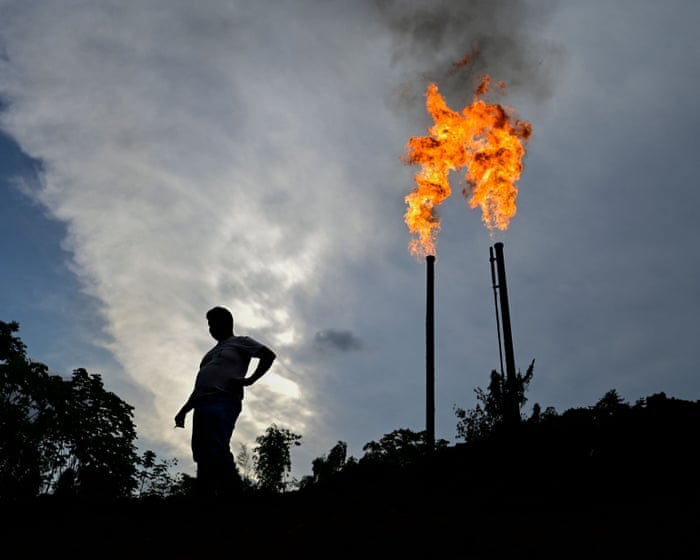A groundbreaking study reveals that a quarter of the world’s population, over 2 billion people, lives within three miles (5 km) of active fossil fuel operations, posing risks to both human health and vital ecosystems.
Amnesty International’s new report, shared exclusively with the Guardian, identifies more than 18,300 oil, gas, and coal sites spread across 170 countries, covering a significant portion of the Earth’s surface. Living near these facilities—such as drilling wells, processing plants, and pipelines—increases the likelihood of health issues like cancer, respiratory and heart diseases, premature births, and death, while also endangering water and air quality and damaging land.
The report, titled “Extraction Extinction: Why the Lifecycle of Fossil Fuels Threatens Life, Nature, and Human Rights,” notes that nearly half a billion people, including 124 million children, reside within 0.6 miles (1 km) of fossil fuel sites. Additionally, around 3,500 new projects are planned or underway, which could expose another 135 million people to pollution, gas flares, and spills.
Many active projects have created pollution hotspots, turning nearby areas into “sacrifice zones” where low-income and marginalized communities suffer the most from contamination. The report highlights the severe health impacts from extraction, processing, and transport, as well as how leaks, flares, and construction harm irreplaceable ecosystems and violate human rights, especially for those living close to fossil fuel infrastructure.
This comes as world leaders, excluding the U.S.—the largest historical emitter of greenhouse gases—meet in Belém, Brazil, for the 30th annual climate talks. Frustration is mounting over the slow progress in phasing out fossil fuels, which are driving environmental collapse and human rights abuses.
Agnès Callamard, Amnesty International’s secretary general, stated, “The fossil fuel industry and its state backers have long claimed that fossil fuels are essential for development. But in reality, they’ve prioritized greed and profit, causing widespread harm to the atmosphere, oceans, and ecosystems with little accountability. Cop30 leaders must focus on people, not profits, by committing to a rapid, fair, and funded transition to sustainable energy for all.”
The Cop30 meeting occurs as the Philippines, Mexico, and Jamaica recover from severe storms worsened by rising temperatures. Countries face increasing pressure to regulate fossil fuel companies, halt extraction, end subsidies, and stop new licenses to comply with a landmark international court ruling.
Last week, the Guardian reported that over 5,350 fossil fuel lobbyists have attended UN climate talks in the past four years, hindering climate action while their employers extract record amounts of oil and gas.
The analysis is based on a first-of-its-kind mapping effort by researchers at the University of Colorado Boulder’s Better Planet Laboratory. They combined data on fossil fuel sites with census information, critical ecosystems, greenhouse gas emissions, and Indigenous lands. The study found that a third of all operational fossil fuel sites overlap with vital ecosystems like wetlands, forests, or rivers, which are crucial for biodiversity and carbon storage, and where damage could lead to ecosystem collapse. The actual global impact is likely even greater due to data gaps.The report draws on documentation of fossil fuel projects and limited census data from various countries. It also features testimonies gathered in collaboration with Columbia Law School’s Smith Family Human Rights Clinic, including those from Indigenous land defenders in Canada, coastal communities in Senegal, fishers in Colombia and Brazil, and Amazonian leaders in Ecuador who are resisting gas flaring.
The findings expose deep-seated environmental injustice and racism in how communities are affected by oil, gas, and coal operations. Indigenous peoples, who make up 5% of the global population, bear a disproportionate burden, with one in six fossil fuel sites located on their lands.
“We’re suffering from intergenerational battle fatigue. We physically won’t survive this. We never started this fight, but we’ve endured the worst of the violence,” said Wet’suwet’en land defender Tsakë ze’ Sleydo’ (Molly Wickham), referring to the planned construction of new compressors for a fossil gas pipeline on Indigenous territory in British Columbia, Canada. “When we stand up to protect Yin’tah [Wet’suwet’en land], we are criminalized.”
The expansion of fossil fuels has been tied to land seizures, cultural destruction, community division, loss of livelihoods, and violence—including online threats and lawsuits, both criminal and civil—against leaders peacefully resisting pipelines, drilling, and other infrastructure.
“We’re not after money; we just want what belongs to us. We only want to fish in Guanabara Bay—it’s our right. And they are taking that away,” said Bruno Alves de Vega, an urban artisanal fisher from Rio de Janeiro, Brazil.
According to the UN special rapporteur on climate change, fossil fuels harm every part of the human body, with especially serious risks for children, older adults, and pregnant individuals, potentially affecting the health of future generations. The rapporteur has called for criminal penalties for those spreading climate disinformation and a complete ban on fossil fuel industry lobbying and advertising.
“The climate crisis reflects and worsens deep-rooted injustices,” added Callamard from Amnesty. “The era of fossil fuels must end now.”
Frequently Asked Questions
Of course Here is a list of FAQs about how fossil fuel projects endanger global health designed to be clear and accessible
Basic Understanding Definitions
1 What does fossil fuel projects endanger the health of two billion people mean
It means that the pollution from activities like burning coal oil and gas for energy is so widespread that nearly 1 in 4 people on Earth breathe air that is unhealthy and contributes to serious diseases like asthma heart problems and lung cancer
2 What are fossil fuels exactly
Fossil fuels are energy sources formed from the remains of ancient plants and animals over millions of years The main types are coal oil and natural gas
3 How do these projects make people sick
Primarily through air pollution Burning fossil fuels releases tiny toxic particles and harmful gases into the air we breathe These pollutants can get deep into our lungs and bloodstream causing or worsening many health issues
Health Impacts Mechanisms
4 What are the specific health problems caused by fossil fuel pollution
Common problems include
Respiratory Asthma bronchitis lung cancer and increased severity of respiratory infections
Cardiovascular Heart attacks strokes and high blood pressure
Neurological Impaired brain development in children and increased risk of dementia in adults
Other Preterm births low birth weight and diabetes
5 Is the danger just from the air
No while air pollution is the biggest threat fossil fuel projects also contaminate water sources through spills and wastewater and contribute to climate change which brings its own health risks like heatwaves famines and the spread of infectious diseases
6 Who is most at risk
Children the elderly pregnant women and people with existing health conditions are most vulnerable People living in poverty and in communities near mines refineries or power plants often face the highest exposure
Scope and Examples
7 Where are these two billion people located
They are located all over the world but the burden is highest in densely populated and rapidly industrializing areas of South Asia East Asia and parts of Africa where air quality standards may be less strict and reliance on coal is high
8 Can you give a realworld example
In many major cities in India and



